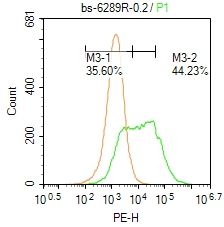ACPT Polyclonal Antibody
Purified Rabbit Polyclonal Antibody (Pab)
- SPECIFICATION
- CITATIONS
- PROTOCOLS
- BACKGROUND

Application
| WB, IHC-P, IHC-F, IF, E |
|---|---|
| Primary Accession | Q9BZG2 |
| Reactivity | Rat, Dog |
| Host | Rabbit |
| Clonality | Polyclonal |
| Calculated MW | 47 KDa |
| Physical State | Liquid |
| Immunogen | KLH conjugated synthetic peptide derived from human ACPT |
| Epitope Specificity | 65-160/437 |
| Isotype | IgG |
| Purity | affinity purified by Protein A |
| Buffer | 0.01M TBS (pH7.4) with 1% BSA, 0.02% Proclin300 and 50% Glycerol. |
| SUBCELLULAR LOCATION | Membrane; Single-pass type II membrane protein (Potential). |
| SIMILARITY | Belongs to the peptidase S1 family.Contains 1 LDL-receptor class A domain.Contains 1 peptidase S1 domain.Contains 1 SRCR domain. |
| Important Note | This product as supplied is intended for research use only, not for use in human, therapeutic or diagnostic applications. |
| Background Descriptions | Acid phosphatases are enzymes capable of hydrolyzing orthophosphoric acid esters in an acid medium. This gene is upregulated by androgens and is down-regulated by estrogens in the prostate cancer cell line. ACPT dephosphorylates receptor tyrosine-protein kinase erbB-4 and inhibits the ligand-induced proteolytic cleavage. ACPT is predominantly expressed in testis but exhibits a lower level of expression in testicular cancer tissues than in normal tissues. ACPT has structural similarity to prostatic and lysosomal acid phosphatases. Alternatively spliced transcript variants have been described, but their biological validity has not been determined. |
| Gene ID | 93650 |
|---|---|
| Other Names | Testicular acid phosphatase, 3.1.3.2, Acid phosphatase 4 {ECO:0000312|HGNC:HGNC:14376}, ACP4 (HGNC:14376) |
| Target/Specificity | High levels in pancreatic, gastric, colorectal and ampullary cancer. Very weak expression in normal gastrointestinal and urogenital tract. |
| Dilution | WB=1:500-2000,IHC-P=1:100-500,IHC-F=1:100-500,IF=1:100-500,Flow-Cyt=0.2ug/test,ELISA=1:5000-10000 |
| Format | 0.01M TBS(pH7.4), 0.09% (W/V) sodium azide and 50% Glyce |
| Storage | Store at -20 ℃ for one year. Avoid repeated freeze/thaw cycles. When reconstituted in sterile pH 7.4 0.01M PBS or diluent of antibody the antibody is stable for at least two weeks at 2-4 ℃. |
| Name | ACP4 (HGNC:14376) |
|---|---|
| Function | May dephosphorylate receptor tyrosine-protein kinase ERBB4 and inhibits its ligand-induced proteolytic cleavage (PubMed:15219672). May play a role in odontogenesis (PubMed:27843125). |
| Cellular Location | Membrane; Single-pass type I membrane protein |
| Tissue Location | Expressed mainly in the testis. Also expressed in the brain where they are enriched at the postsynaptic sites. Expressed at lower levels in the trachea, prostate, bone marrow, spinal cord, colon, fetal brain, heart, thymus, fetal liver, spleen, leukocytes, ovary, small intestine, pancreas and skeletal muscle. Expression is significantly lower in testicular cancer tissues than in normal testicular tissues. Isoform 3 is expressed in the testis, trachea, prostate and bone marrow. |

Thousands of laboratories across the world have published research that depended on the performance of antibodies from Abcepta to advance their research. Check out links to articles that cite our products in major peer-reviewed journals, organized by research category.
info@abcepta.com, and receive a free "I Love Antibodies" mug.
Provided below are standard protocols that you may find useful for product applications.
If you have used an Abcepta product and would like to share how it has performed, please click on the "Submit Review" button and provide the requested information. Our staff will examine and post your review and contact you if needed.
If you have any additional inquiries please email technical services at tech@abcepta.com.













 Foundational characteristics of cancer include proliferation, angiogenesis, migration, evasion of apoptosis, and cellular immortality. Find key markers for these cellular processes and antibodies to detect them.
Foundational characteristics of cancer include proliferation, angiogenesis, migration, evasion of apoptosis, and cellular immortality. Find key markers for these cellular processes and antibodies to detect them. The SUMOplot™ Analysis Program predicts and scores sumoylation sites in your protein. SUMOylation is a post-translational modification involved in various cellular processes, such as nuclear-cytosolic transport, transcriptional regulation, apoptosis, protein stability, response to stress, and progression through the cell cycle.
The SUMOplot™ Analysis Program predicts and scores sumoylation sites in your protein. SUMOylation is a post-translational modification involved in various cellular processes, such as nuclear-cytosolic transport, transcriptional regulation, apoptosis, protein stability, response to stress, and progression through the cell cycle. The Autophagy Receptor Motif Plotter predicts and scores autophagy receptor binding sites in your protein. Identifying proteins connected to this pathway is critical to understanding the role of autophagy in physiological as well as pathological processes such as development, differentiation, neurodegenerative diseases, stress, infection, and cancer.
The Autophagy Receptor Motif Plotter predicts and scores autophagy receptor binding sites in your protein. Identifying proteins connected to this pathway is critical to understanding the role of autophagy in physiological as well as pathological processes such as development, differentiation, neurodegenerative diseases, stress, infection, and cancer.


